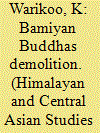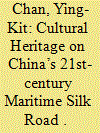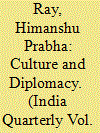|
|
|
Sort Order |
|
|
|
Items / Page
|
|
|
|
|
|
|
| Srl | Item |
| 1 |
ID:
152439


|
|
|
| 2 |
ID:
159340


|
|
|
|
|
| Summary/Abstract |
This article suggests that Chinese scholars in Guangdong, through historical work endorsed or sponsored by their government, justify the inclusion of Southeast Asian nations in the 21st-century Maritime Silk Road (MSR) initiative. In doing so, they seek to add the MSR to the United Nations Educational, Scientific and Cultural Organization’s (UNESCO) World Heritage List. By exploring how historians and officials adhere to the expectations of the Chinese state and UNESCO in highlighting Guangdong’s role in the 21st-century MSR initiative, the article examines the production of cultural heritage at the local level in contemporary China.
|
|
|
|
|
|
|
|
|
|
|
|
|
|
|
|
| 3 |
ID:
174937


|
|
|
|
|
| Summary/Abstract |
The article argues that UNESCO’s 1972 World Heritage Convention provides a global platform for projecting not only India’s maritime cultural heritage but also building bridges and collaborative networks with other Indian Ocean littoral countries for the promotion of shared cultural practices and traditional knowledge systems of the Indian Ocean. Unfortunately, this collaborative research aspect of the World Heritage Convention has yet to be tapped for nominating and inscribing transnational heritage or cultural routes across the Ocean. This is despite the fact that India was the founder member of the intergovernmental organisation, Indian Ocean Rim Association, one of whose thrust areas relates to promoting cultural heritage on the UNESCO platform. Given India’s rich maritime past, there is an urgent need to implement measures to establish academic networks with littoral countries for not only creating awareness of the maritime cultural heritage of the Indian Ocean but also harnessing linkages between maritime communities for building a culturally diverse but harmonious future.
|
|
|
|
|
|
|
|
|
|
|
|
|
|
|
|
| 4 |
ID:
103852


|
|
|
|
|
| Publication |
2011.
|
| Summary/Abstract |
This article critically appraises and evaluates tourism strategies and heritage management in Luang Prabang, Lao People's Democratic Republic, a Unescodesignated "world heritage" city. Luang Prabang is widely regarded as one of the most significant heritage cities in Southeast Asia. The city is renowned for its Buddhist and royal culture and also its historic vernacular Lao, French, and Lao-French architecture. The city earned world heritage status in 1995, but since that time the boom in in-bound Asian tourism has put pressures on Luang Prabang's authenticity and, for some, called into question the validity of its world heritage status. This article examines these substantial and wide-ranging pressures and argues that the growth in tourism and the treatment of Luang Prabang's heritage are symptoms of broader regional processes of political and economic change, including the expansion of Chinese and Korean investment and the growth of intra-regional tourism. The authors argue that it is unreasonable to expect traditional heritage management mechanisms, including the world heritage listing, to be able to cope with the pressures on sites like Luang Prabang. The very least that is required, the authors contend, is an expanded understanding of the context in which heritage places sit, and the authors make a case that the cultural landscapes approach, combined with explicit concern for intangible heritage and poverty alleviation, must be at the core of any strategy for long-term protection of the city's cultural heritage values.
|
|
|
|
|
|
|
|
|
|
|
|
|
|
|
|
| 5 |
ID:
104257


|
|
|
|
|
| Publication |
2011.
|
| Summary/Abstract |
International Affairs: UNESCO has celebrated its 65th anniversary in the 21st century. What signs of the new times are reflected in the Organization's tasks and their implementation? In this context, how do you assess Russia's contribution to its activities?
Eleonora Mitrofanova: UNESCO's "big anniversary" was in mid-November 2010, and its main event - a celebration ceremony at the UNESCO headquarters in Paris - was held in December with the participation of many distinguished guests, former heads of the Organization, UNESCO Goodwill Ambassadors and Artists for Peace, well-known public and cultural figures, scholars and diplomats.
|
|
|
|
|
|
|
|
|
|
|
|
|
|
|
|
| 6 |
ID:
191794


|
|
|
|
|
| Summary/Abstract |
United Nations Educational, Scientific and Cultural Organisation (UNESCO) strives to increase the number of natural World Heritage Sites to protect it from the onslaught of climate change and anthropogenic disturbances. The international community at the Paris Agreement on climate change in 2015 recognized reducing emissions from deforestation and forest degradation and the role of conservation, sustainable management of forests, and enhancement of forest carbon stocks in developing countries as one of the best low cost panacea for global environmental problems. India, in its Nationally Determined Contributions (NDCs) promised to increase its forest cover as an effort toward the mitigation of climate change. All these efforts are directed toward saving our Earth from the worst impacts of global warming. In the midst of these efforts, the conservation of Western Ghats is one of the central hotspots of biodiversity and deserves special attention. Thus, this paper looks into the questions how the Heritage Tag and Western Ghats Ecology Expert Panel (WGEEP) report causes intricacies in the conservation of Western Ghats? And why local inhabitants are so much apprehensive about the conservation of their region? This study proves that negligence in addressing the concerns and participation of affected stakeholders, from the framing of the conservation projects to its implementation, leads anti-conservation movements. Additonally, such conservation projects will never break ground and will remain on paper.
|
|
|
|
|
|
|
|
|
|
|
|
|
|
|
|
|
|
|
|
|